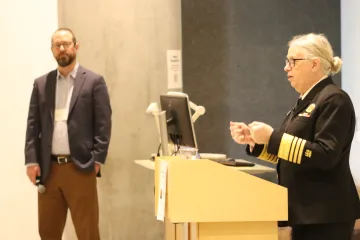U.S. Assistant Secretary for Health Admiral Rachel Levine Introduces Online Environmental Justice Index Tool in Tucson

U.S. Assistant Secretary of Health Admiral Rachel L. Levine speaks to a crowd at ENR2 on Thursday, December 8, 2022.
Admiral Rachel L. Levine, the U.S. Assistant Secretary for Health at the U.S. Department of Health and Human Services (HHS), and members of her staff joined the Udall Center and the Office of Research, Innovation and Impact to introduce the new HHS Environmental Justice Index (EJI) to faculty, staff, and students at the ENR2 building on the University of Arizona campus last Thursday, December 8, 2022.
The event, hosted by Udall Center Assistant Research Professor Ladd Keith, featured ADM Levine’s remarks on the launch of HHS’ Office of Climate Change and Health Equity (OCCHE) as well as a presentation by her staff on the EJI and how to use it. Levine serves as the 17th Assistant Secretary for Health at HHS and the head of the U.S. Public Health Service Commissioned Corps.
Levine began her career as a physician in academic medicine focused on the intersection between mental and physical health, treating children, adolescents, and young adults. She later served as Pennsylvania’s Physician General and Pennsylvania’s Secretary of Health, where she addressed COVID-19, the opioid crisis, behavioral health and other public health challenges. She was nominated to her current position as Assistant Secretary for Health by President Joe Biden in February of 2021.
Levine is the first openly transgender person to hold a government office that requires a Senate confirmation and the first openly transgender four-star officer in any of the nation’s eight branches of uniformed service.
UArizona Environmental Justice and Health Equity Meeting

Udall Center Research Professor Ladd Keith looks on during Admiral Levine's opening keynote remarks.
According to the Assistant Secretary, discussions about health have “not usually been on the table” in conversations about how to address climate change despite the fact that “more than 200 medical journals declared climate change the greatest threat to global public health” in September 2021. Levine says that the establishment of OCCHE “is really putting health on the map in terms of the climate change discussion.”
Admiral Levine noted that OCCHE is currently operating without congressional funding that would help HHS to address issues critical to achieving health equity in the face of increasing global threats that are the result of climate change.
“Certain populations – those that have experienced historic and ongoing discrimination, including disenfranchisement, underinvestment and the results of systemic racism – bear a disproportionate burden” from the impacts of climate change, Levine said.
“Climate change is a massive public health risk,” said Levine, “and our office will be the center of that conversation.” The top priority for OCCHE, she explained, is “identifying disproportionately exposed communities,” a process that will be made easier by the Centers for Disease Control and Prevention’s (CDC) new online EJI.
The Environmental Justice Index

From left to right, CAPLA Dean Nancy Pollock-Ellwand, UArizona President Robert Robbins, and Professor Ladd Keith.
Following opening remarks by Admiral Levine, a 30-minute presentation by her staff included a training on how researchers can best use the new EJI tool, which uses data from the U.S. Census Bureau, the U.S. Environmental Protection Agency, the U.S. Mine Safety and Health Administration, and the CDC to rank the cumulative impacts of environmental injustice on health for every census tract in the United States.
Census tracts are subdivisions of counties for which the Census collects statistical data. The EJI ranks each tract on 36 environmental, social, and health factors and groups them into three overarching modules and ten different domains.
The EJI, which was developed by the CDC’s Agency for Toxic Substances and Disease Registry in partnership with HHS’ Office of Environmental Justice (another Office established by Admiral Levine that has yet to receive congressional funding), is the first national, geographic-driven tool designed to measure the cumulative impacts of environmental burden through the lenses of human health and health equity.
The EJI, Levine explained, “is a high-level mapping and screening tool that characterizes cumulative impacts and patterns of environmental injustice across the United States. It delivers a single score for each community and social factors such as poverty, race and ethnicity, along with preexisting health conditions, are factored in.”
The keynote and training attracted nearly 100 researchers, leaders, and students from schools and colleges across the UArizona campus, including University of Arizona President Robert Robbins, Associate Vice President of University Research Institutes Elliot Cheu, and Senior Vice President for Native American Advancement and Tribal Engagement N. Levi Esquerra.
Learn more about Admiral Rachel Levine here.
Learn more about the Environmental Justice Index here.

